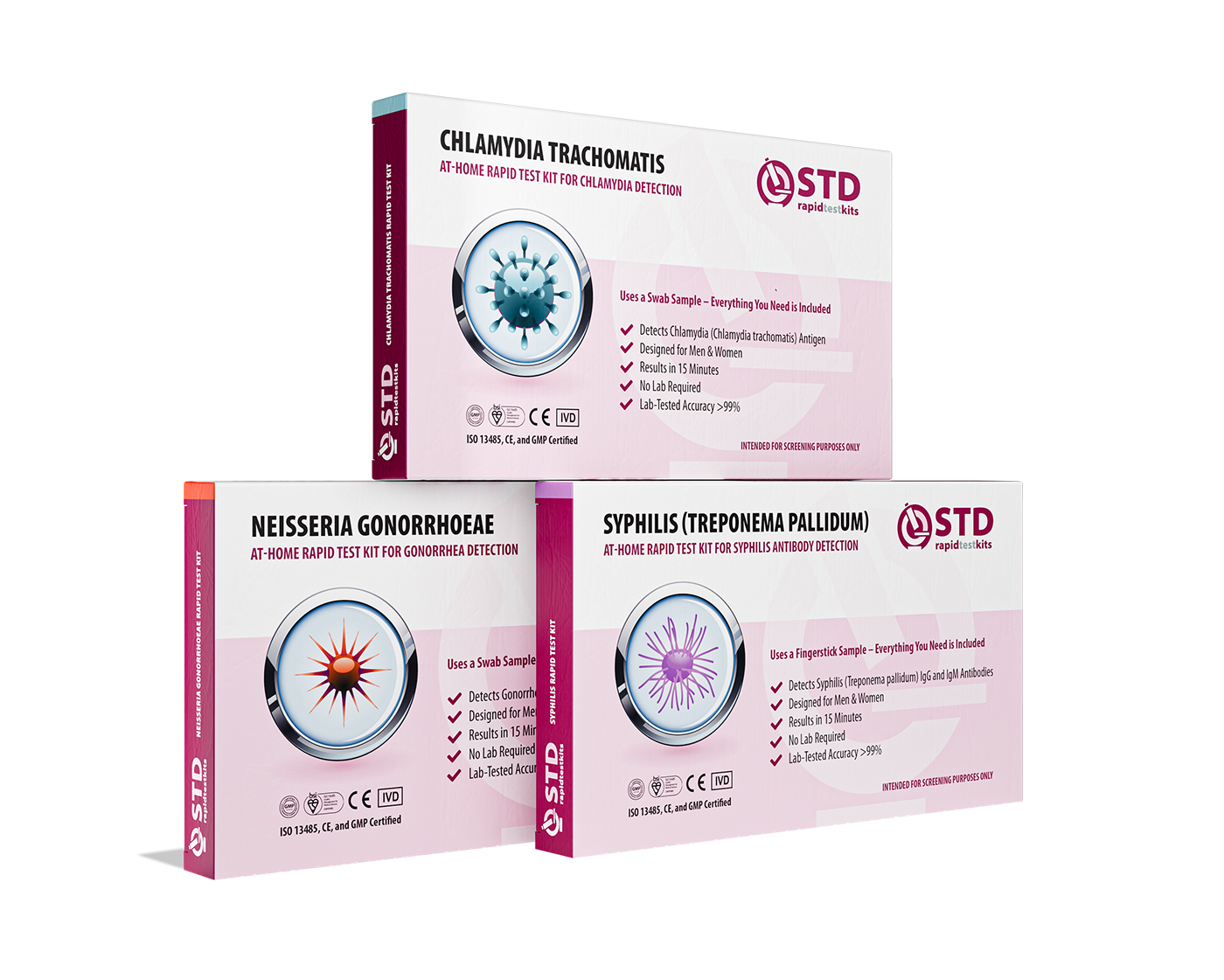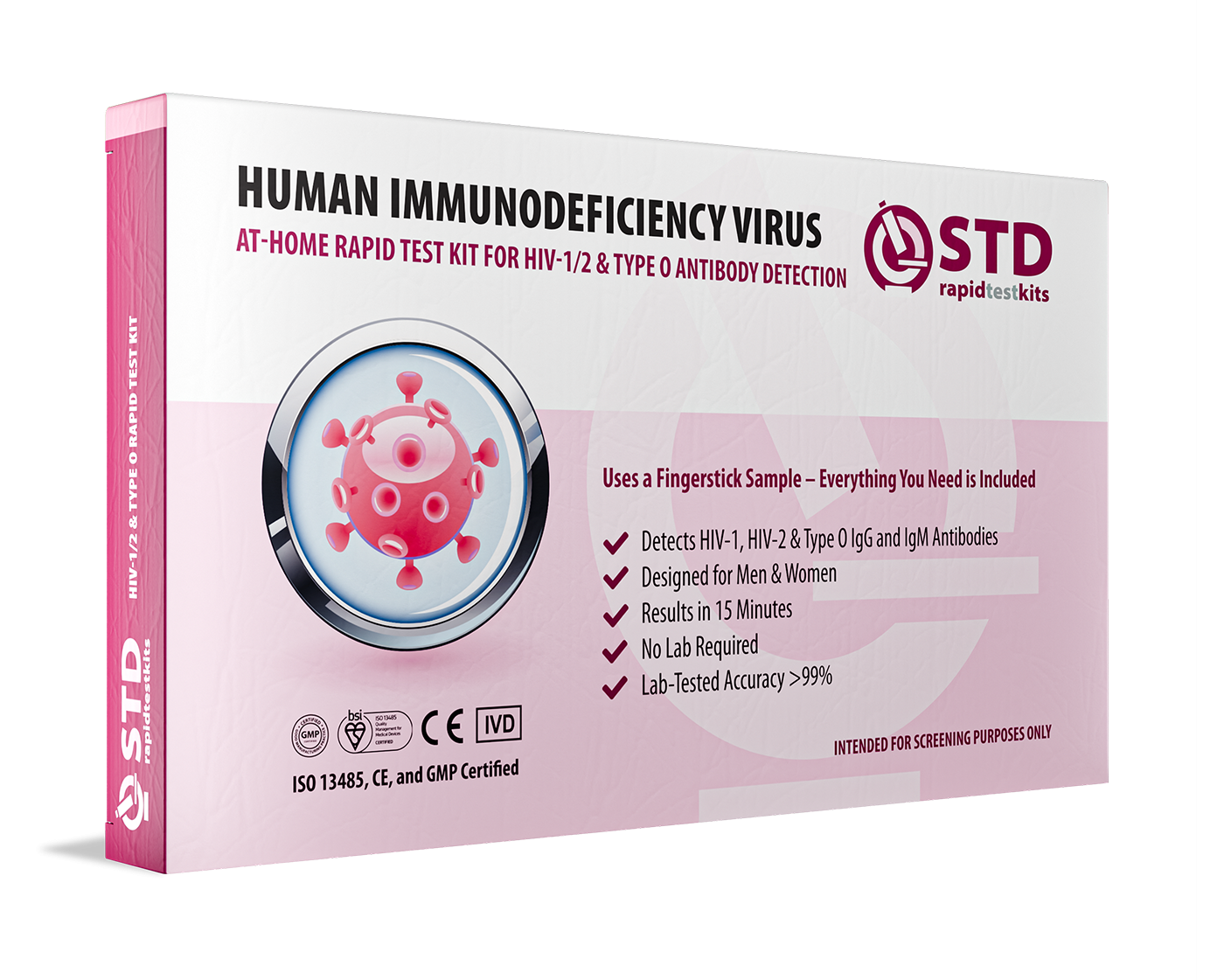Quick Answer: Premarital STD testing identifies silent infections that can harm both partners and future children. Even without symptoms, you can carry and transmit STDs, testing ensures health, trust, and peace of mind before marriage.
This Isn’t Just About You, It’s About the Life You’re Building
When you say “I do,” you’re not only committing to a person, but to the health and future you’ll share. Yet many couples skip one of the simplest, most protective steps before marriage: an STD test. Not because they’re reckless, but because of assumptions, about trust, monogamy, and what “healthy” looks like. According to the Centers for Disease Control and Prevention (CDC), 1 in 5 people in the United States has an STD at any given time, and many don’t know it. Infections like Chlamydia, Gonorrhea, and Herpes can remain symptomless for months or years, silently affecting fertility and long-term health.
Some countries make premarital testing a legal requirement, primarily to prevent transmission of HIV or other chronic infections to a spouse or future child. In places without such laws, the decision falls entirely on couples. Unfortunately, cultural discomfort often keeps the conversation buried. “We didn’t want it to feel like an accusation,” one groom-to-be told me, “but in the end, we realized testing was the most loving thing we could do for each other.”

People are also reading: Syphilis Effects on the Brain: Why Untreated Syphilis Is So Dangerous
When Silence Is a Symptom Too
If you’re looking for a rash, discharge, or pain as proof of infection before your wedding, you could be waiting forever. More than half of new Chlamydia infections are symptomless, especially in women. HPV, the most common sexually transmitted infection, often resolves without symptoms but can lead to cervical cancer years later. HIV can incubate silently for months while still being transmissible. The absence of discomfort doesn’t equal the absence of risk.
Imagine flying to your honeymoon destination, basking in the warmth of a beach sunset, only to be interrupted days later by burning during urination or unexplained sores. Beyond the physical discomfort, the emotional strain can be enormous, suspicion, self-blame, and guilt creeping into what should be one of your most joyful weeks. This isn’t scare-mongering; it’s the reality couples have quietly lived through and shared in online forums, sometimes discovering their infections during post-wedding medical visits.
Myth-Busting: Love Doesn’t Cancel Out Biology
One of the most common misconceptions I hear is, “We’ve been exclusive for years, so there’s no way we could have an STD.” It’s a comforting thought, but not a medically sound one. STDs don’t check your relationship status before infecting you, they only need an opportunity, and sometimes that opportunity happened long before your current relationship began. Many infections can lie dormant or undetected, which means even couples who have been together for a decade could test positive for something they picked up long before they met.
The idea that “you’d know if you had one” is equally misleading. Research published in the JAMA Network found that a significant proportion of couples who tested together for HIV and other STDs did so without suspecting any infection, yet results still revealed silent cases. Premarital testing isn’t about mistrust; it’s about transparency, prevention, and the understanding that biology doesn’t bend for romance.
Check Your STD Status in Minutes
Test at Home with Remedium7-in-1 STD Test Kit

 For Men & Women
For Men & Women Results in Minutes
Results in Minutes No Lab Needed
No Lab Needed Private & Discreet
Private & DiscreetOrder Now $129.00 $343.00
For all 7 tests
The Science Speaks: Why Premarital Screening Works
Studies from Saudi Arabia to Pakistan show that premarital screening programs significantly reduce the incidence of STDs, genetic disorders, and certain chronic illnesses in newly married couples. These screenings don’t just test for infections, they often include blood work to detect genetic conditions, hepatitis, and more. In regions where testing is mandatory, rates of congenital infections in newborns have decreased, proving the direct public health benefit of knowing your status before tying the knot.
In the U.S., no such mandate exists, but public health experts agree that voluntary couple-based testing, especially before major life transitions like marriage, offers an unmatched opportunity to catch and treat infections early. It’s an act of mutual care, akin to making a will or setting up life insurance: you hope you’ll never need it, but you’ll be glad you did it.
From ‘Will You Marry Me?’ to ‘Let’s Get Tested’
In the weeks before their wedding, Priya and Amir found themselves caught up in the chaos of final fittings, guest lists, and last-minute catering changes. On a late-night walk through their quiet neighborhood, Priya brought it up, casually at first.
“You know how we’ve been ticking things off the wedding checklist? I think we should add STD testing.”
Amir stopped mid-step, not because he disagreed, but because the thought had simply never crossed his mind. “Do you think there’s a risk?” he asked. Priya smiled, “It’s not about risk. It’s about starting our marriage knowing everything we can about our health.”
That night, they booked a pair of appointments at a local clinic. Two days later, they had their results: negative across the board. The relief was immediate, but so was something else, a deepened sense of trust. “We didn’t need the results to know we trusted each other,” Priya later said, “but seeing it on paper made us feel even closer.”
The Conversation Most Couples Avoid
Asking your partner to get tested before marriage can feel daunting, especially if you’ve never discussed past sexual health. Fear of offending them, of stirring up suspicion, or of opening an old wound often keeps the topic off the table. But avoiding the conversation doesn’t erase the risks. In fact, research in the International Journal of Collaborative Research on Internal Medicine & Public Health found that couples who discussed STD testing openly before marriage were significantly more likely to follow through on it, and to describe their relationship as “more trusting” afterward.
If you’re not sure how to bring it up, start with shared goals rather than suspicion. You could say, “We’ve talked about kids in the future, getting tested now can make sure we’re both starting that journey in the best health possible.” Or, “We’re about to share everything, our home, our finances, our lives. Let’s share our health status too.” Framing it as a mutual step for mutual benefit keeps the conversation collaborative, not accusatory.

People are also reading: Why Men Should Worry About HPV.
But We’re Symptom-Free, Do We Really Need It?
The short answer: yes. The long answer: absolutely, yes. Infections like Chlamydia and Gonorrhea can cause pelvic inflammatory disease in women and reduced fertility in men without ever causing a single noticeable symptom. Syphilis can hide quietly in your system for years before causing neurological or cardiovascular damage. The World Health Organization estimates that over 374 million new infections of curable STDs occur every year worldwide, with many going undetected until complications arise.
Being symptom-free is not a guarantee of being infection-free. In fact, “silent” infections are one of the main reasons public health experts push for routine screening. The absence of symptoms often leads to a false sense of security, which delays diagnosis and increases the likelihood of passing the infection to your partner, sometimes even to your future child during pregnancy or birth.
Breaking the Stigma Around Testing
For decades, STD testing has been tangled up in moral judgment, whispered about in clinic waiting rooms, or avoided altogether out of shame. But there’s nothing inherently shameful about knowing your status. In the same way you wouldn’t feel guilty about getting a cholesterol test or a blood pressure check, you shouldn’t feel guilt about an STD screen. Testing is simply another part of responsible health maintenance, especially before a major life event like marriage.
Some couples even use the testing process as a bonding activity. They book their appointments together, take the day off work, and reward themselves afterward with dinner or a small celebration. “We made a date out of it,” one woman told me. “It was fun, actually, and it set the tone for how we want to handle health stuff as a couple. Open, no drama, just taking care of each other.”
Why At-Home Tests Are Changing the Game
While clinics remain a trusted option, at-home STD testing kits have made premarital screening more accessible and private than ever. You can now order a discreet Combo STD Home Test Kit, collect samples in your own space, and get results quickly, sometimes in under 20 minutes. For couples who want privacy or have busy schedules, this is a low-stress alternative that still delivers accuracy and peace of mind.
That convenience also helps normalize testing. The easier it is to access, the less intimidating it becomes. And when it’s easy, it’s far more likely to get done before the wedding rather than postponed until “later”, a later that often never comes.
Check Your STD Status in Minutes
Test at Home with Remedium3-in-1 STD Test Kit

 For Men & Women
For Men & Women Results in Minutes
Results in Minutes No Lab Needed
No Lab Needed Private & Discreet
Private & DiscreetOrder Now $69.00 $147.00
For all 3 tests
Case Study: The Honeymoon Surprise
Lena and David didn’t see the point of premarital testing. They’d been together for six years, were each other’s first sexual partners, and never had any symptoms. It wasn’t until their honeymoon in Bali, when David developed painful sores, that they realized something was wrong. A local clinic diagnosed him with Genital Herpes. The infection had been dormant, likely contracted years earlier from non-intercourse sexual contact, and surfaced for the first time due to the stress and travel. The news blindsided them both, cutting their celebration short and introducing an entirely new dynamic into their marriage just days in.
Lena now advocates for premarital testing. “If I could go back, I’d get tested in a heartbeat,” she says. “Not because I didn’t trust David, but because I’d rather have had that conversation at home, with our own doctor, instead of in a foreign clinic with a language barrier.”
Prevention Is Part of the Love Story
Testing before marriage isn’t about anticipating betrayal, it’s about protecting the shared life you’re about to begin. And the truth is, prevention doesn’t end once the wedding rings are on. Just like you’ll keep an eye on your financial health, your sexual health deserves ongoing attention. That can mean regular checkups, vaccinations like the HPV vaccine, and honest conversations about any changes in sexual activity, even years into the marriage.
When testing becomes a normal part of your relationship, it’s easier to make other prevention measures feel normal, too. Using condoms in certain situations, getting screened for HIV and Syphilis during pregnancy, or talking openly about sexual history with new healthcare providers, it all starts to feel less like a taboo and more like a shared commitment to each other’s well-being.
Integrating Testing into Wedding Planning
You can add testing to your wedding checklist if you can plan a dessert table with different levels or match the colors of the napkins. A lot of couples set up their screenings three months before the wedding. This gives you time to deal with any good results from treatment or follow-up care without adding extra stress to the week of the wedding.
Some people even include testing as part of other health checks before marriage, like genetic counseling or fertility screenings. In some parts of the Middle East and Asia, premarital screening programs are often sold this way, with one appointment testing for STDs, hereditary diseases, and blood compatibility all at once. Even if you live somewhere that doesn't have these programs, combining appointments can make the process go more smoothly and make it feel like just another step toward building your future together.

People are also reading: Winter STD Testing: Why It's Smart to Get Tested Before the Holidays
When the Results Aren’t What You Expected
Finding out you or your partner has an STD before the wedding can be unsettling, but it’s also a chance to address the issue in a supportive, proactive way. Most STDs are treatable, and those that aren’t, like Herpes or HIV, can be managed with medication to the point of dramatically reducing transmission risk. The CDC reports that with consistent treatment, HIV can reach “undetectable” status, meaning it can’t be sexually transmitted.
How you respond matters more than the result itself. A diagnosis doesn’t erase the love you’ve built, and it certainly doesn’t have to cancel a wedding. What it does is give you the knowledge and tools to protect each other moving forward. One couple I spoke to delayed their wedding by six months after one partner was diagnosed with Syphilis, not out of shame, but to ensure full treatment was completed. “It made us feel like we were walking into marriage with nothing hidden,” they told me.
Sex-Positive, Shame-Free Communication
The key to making premarital STD testing a positive experience is to strip away the shame that so often surrounds it. This means being intentional about your language, saying “Let’s get tested” instead of “I think you might have something,” or “I want to know our status” instead of “I’m worried about what you’ve done.” It’s about making health conversations as normal as talking about your budget or your guest list.
And yes, it’s also about affirming the sexual side of your relationship. Being able to have safe, uninhibited intimacy on your honeymoon, without the shadow of “what if?”, is a gift to both of you. As one bride put it, “Knowing we’d both been tested was like packing an extra layer of comfort into our honeymoon suitcase.”
The Role of At-Home Testing in Keeping It Simple
We live in a time when privacy and speed are top priorities, and sexual health testing has caught up. At-home kits allow couples to complete their screenings together without stepping into a clinic. You order online, follow the included instructions, and get quick, accurate results in the privacy of your home. Some couples even choose to make it part of a “self-care day” leading up to the wedding, pairing testing with massages, movie nights, or dinner in.
By removing logistical barriers, time off work, travel to a clinic, or navigating insurance coverage, at-home testing makes it easier for couples to act on their good intentions. And as public health experts know, when something is easier, it’s far more likely to happen.
Check Your STD Status in Minutes
Test at Home with RemediumHIV Rapid Test Kit

 For Men & Women
For Men & Women Results in Minutes
Results in Minutes No Lab Needed
No Lab Needed Private & Discreet
Private & DiscreetOrder Now $33.99 $49.00
Love Is in the Details, And So Is Safety
The difference between couples who skip testing and those who make it part of their wedding prep often comes down to perspective. The former see it as an awkward, optional conversation. The latter see it as one more way to honor and protect their partner. Just as you’d plan for weather contingencies, dietary restrictions, or travel logistics, you can plan for health security. It’s not romantic in the candlelight-and-roses sense, but in the “I care enough to keep you safe” sense, which, in the long run, might be the deepest romance of all.
FAQs
1. If we've never had other partners, can we skip STD testing?
No. Some STDs can be passed on through sexual contact that doesn't involve sex or from birth. Testing makes sure, even in relationships where there have been no partners before.
2. What STDs should you get tested for before you get married?
HIV, syphilis, hepatitis B and C, chlamydia, gonorrhea, and sometimes herpes and HPV are some of the most common tests done before marriage.
3. Is it against the law to test people before they get married?
It depends on where you are in the world. Some places require couples to get tested for certain infections before they can get a marriage license, while others leave it up to the couple.
4. How long before the wedding should we get tested?
Three months before the wedding is best because it gives you time to get treatment if you need it without adding stress to the last few weeks.
5. Is it possible to get rid of STDs before the wedding?
If caught early, many STDs, such as Chlamydia, Gonorrhea, and Syphilis, can be treated and cured with medicine. Others, like HIV or herpes, can be managed well to keep them from spreading.
6. Will insurance pay for STD testing before marriage?
Basic STD testing is covered by preventive care in many countries, but the amount of coverage varies. People often have to pay for at-home test kits themselves.
7. Is it possible to test for STDs at home?
Yes. The Combo STD Home Test Kit and other at-home options offer privacy, ease of use, and quick results.
8. If one partner has already been tested, do we both need to be tested?
Yes. Even if one partner has recently tested positive for an infection, both partners should still get tested to make sure they haven't missed any or gotten any new ones.
9. What if one of us has a positive test?
Most STDs can be treated. Those that aren't can be managed to lower or get rid of the risk of transmission. It's important to talk to each other and get medical advice.
10. Is premarital testing only for straight couples?
No. Testing is good for couples of all sexual orientations and gender identities, and panels can be made to fit each couple's needs.
Don't Wait and Wonder
In the end, premarital STD testing isn’t about doubt, it’s about devotion. It’s a way of saying, “I care enough about our life together to make sure we start it with the fullest picture of our health.” For Hannah and Mark, for Priya and Amir, and even for Lena and David, the lesson is the same: love thrives in the light, not in the shadows of “what if.”
Don’t wait for symptoms that may never come. Don’t gamble on trust without verification, not because you don’t trust your partner, but because you love them enough to take care of both your futures. And the good news? You can do it quickly, discreetly, and on your terms.
Sources
1. World Health Organization: Sexually Transmitted Infections
2. JAMA Network Open: Couple-Based HIV/STI Testing Outcomes
3. PMC: Premarital Screening and Genetic Counseling
4. ResearchGate: Importance of Premarital Checkup










